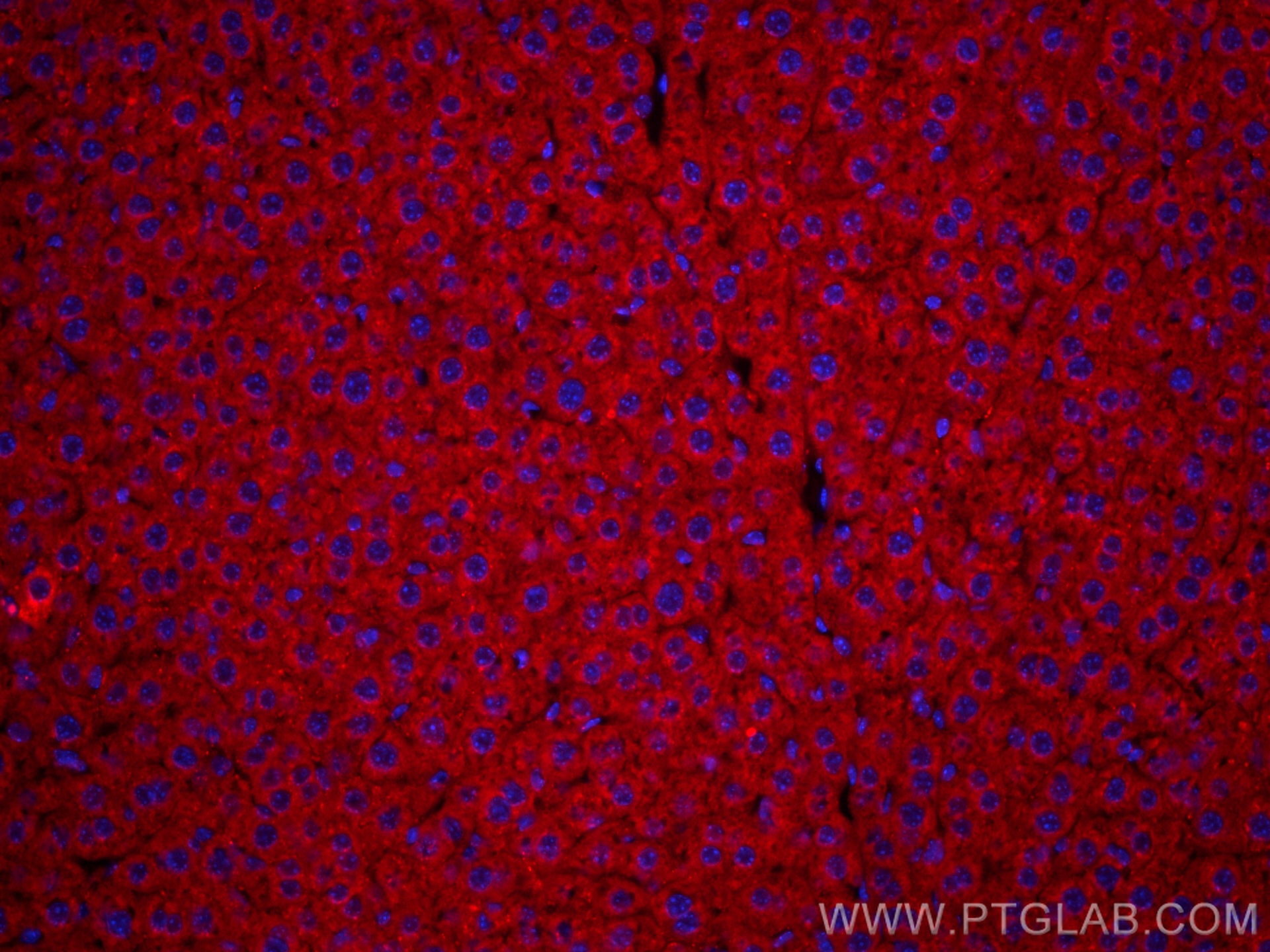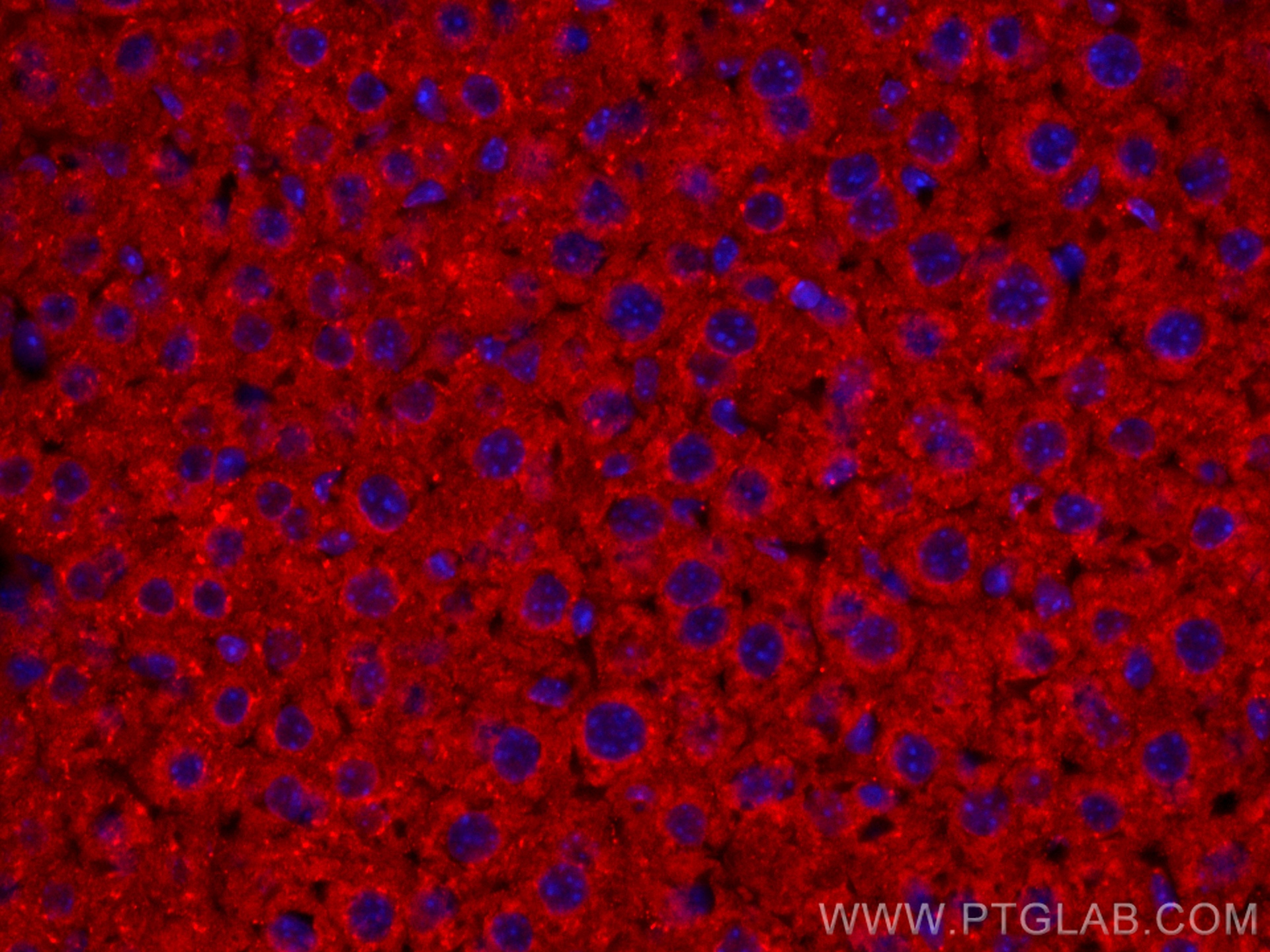验证数据展示
经过测试的应用
| Positive IF-P detected in | mouse liver tissue |
推荐稀释比
| 应用 | 推荐稀释比 |
|---|---|
| Immunofluorescence (IF)-P | IF-P : 1:50-1:500 |
| It is recommended that this reagent should be titrated in each testing system to obtain optimal results. | |
| Sample-dependent, Check data in validation data gallery. | |
产品信息
CL594-16475 targets Albumin in IF-P applications and shows reactivity with human, mouse, rat samples.
| 经测试应用 | IF-P Application Description |
| 经测试反应性 | human, mouse, rat |
| 免疫原 |
CatNo: Ag9569 Product name: Recombinant human Albumin protein Source: e coli.-derived, PGEX-4T Tag: GST Domain: 256-609 aa of BC034023 Sequence: SKLVTDLTKVHTECCHGDLLECADDRADLAKYICENQDSISSKLKECCEKPLLEKSHCIAEVENDEMPADLPSLAADFVESKDVCKNYAEAKDVFLGMFLYEYARRHPDYSVVLLLRLAKTYETTLEKCCAAADPHECYAKVFDEFKPLVEEPQNLIKQNCELFEQLGEYKFQNALLVRYTKKVPQVSTPTLVEVSRNLGKVGSKCCKHPEAKRMPCAEDYLSVVLNQLCVLHEKTPVSDRVTKCCTESLVNRRPCFSALEVDETYVPKEFNAETFTFHADICTLSEKERQIKKQTALVELVKHKPKATKEQLKAVMDDFAAFVEKCCKADDKETCFAEEGKKLVAASQAALGL 种属同源性预测 |
| 宿主/亚型 | Rabbit / IgG |
| 抗体类别 | Polyclonal |
| 产品类型 | Antibody |
| 全称 | albumin |
| 别名 | ALB, Serum albumin, HSA |
| 计算分子量 | 609 aa, 69 kDa |
| 观测分子量 | 66 kDa |
| GenBank蛋白编号 | BC034023 |
| 基因名称 | Albumin |
| Gene ID (NCBI) | 213 |
| RRID | AB_2919832 |
| 偶联类型 | CoraLite®594 Fluorescent Dye |
| 最大激发/发射波长 | 588 nm / 604 nm |
| 激发激光 | Yellow-Green Laser (561 nm) |
| 形式 | Liquid |
| 纯化方式 | Antigen affinity purification |
| UNIPROT ID | P02768 |
| 储存缓冲液 | PBS with 50% glycerol, 0.05% Proclin300, 0.5% BSA, pH 7.3. |
| 储存条件 | Store at -20°C. Avoid exposure to light. Stable for one year after shipment. Aliquoting is unnecessary for -20oC storage. |
背景介绍
Albumin is the most abundant protein in blood plasma. Alterations of level of serum albumin are linked to variety of diseases. Albumin is expressed exclusively by well-differentiated hepatocytes, thus anti-albumin has been used to mark hepatocytes. In additon, glycated serum albumin is also a potential diabetes biomarker. The N-terminal 24aa of albumin will be cleaved to generate the mature form of serum albumin with MW 66 kDa. (21388516, 23832071)
实验方案
| Product Specific Protocols | |
|---|---|
| IF protocol for CL594 Albumin antibody CL594-16475 | Download protocol |
| Standard Protocols | |
|---|---|
| Click here to view our Standard Protocols |



